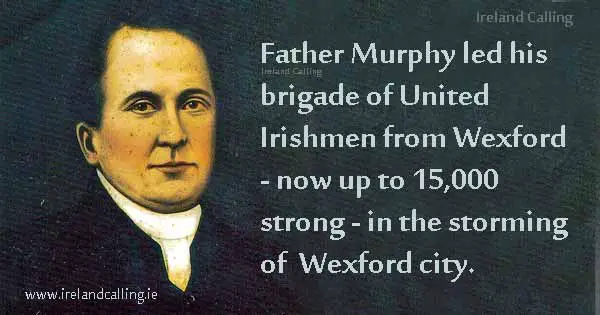july-top.html
1798 United Irishmen rebels defeated a small troop of British soldiers at Ballraheen Hill on this day in 1798. It was one of the last victories for the rebels, as their rebellion struggled to keep momentum. They had already been driven from County Wexford by the British troops. As the rebels spread north into the country they became isolated.
The British were better organised and better equipped for battle. Several more battles followed in the next few months, with the British firmly taking back control of the country.
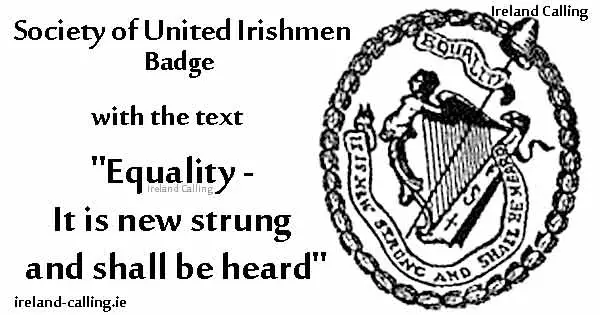
* * *
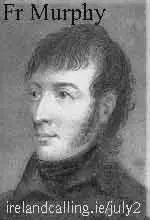 1798 Father John Murphy was executed on this day in 1798. He was one of the leaders of the failed United Irishmen rebellion. He was born in Wexford and studied for the priesthood in Spain before returning to Ireland.
1798 Father John Murphy was executed on this day in 1798. He was one of the leaders of the failed United Irishmen rebellion. He was born in Wexford and studied for the priesthood in Spain before returning to Ireland.
It was under Father Murphy that the rebellion began. The United Irishmen leaders were holding off until they had secured military support from France.
However, an incident in County Wexford meant that there was no turning back for the rebels.
A patrol of British soldiers were investigating a potential rebel stronghold in the town of Harrow. They didn’t find anyone but burnt the house down as a warning to other rebels.
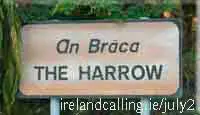 They then left the scene but came across Father Murphy and his followers who were holding a meeting about the best course of action to deal with the intimidation they were being subjected to by the patrolling British troops.
They then left the scene but came across Father Murphy and his followers who were holding a meeting about the best course of action to deal with the intimidation they were being subjected to by the patrolling British troops.
After seeing the house burning, the rebels confronted the British patrol and a fight broke out. Most of the British soldiers fled as they were heavily outnumbered, but two were killed in the incident including their commanding officer. Father Murphy knew there was no turning back and sent the message to other United Irishmen leaders around the country that the rebellion had started.
Father Murphy led the rebels in several battles in and around the area of Wexford. To say he was a man of the clergy, he proved himself as a skilled military tactician. The British army were armed with muskets and cannons, whereas the rebels only had pikes.
Father Murphy overcame this disadvantage at the Battle of Oulart, when he ordered his men to hide behind bushes and walls at the roadside. As the British forces approached, the rebels put their hats on their pike and held them above the walls to tempt the British into opening fire on them. Once the gunfire stopped, the rebels charged over the wall and attacked their enemies with pikes. The British soldiers were defenceless to the attack as they tried to reload their empty guns.
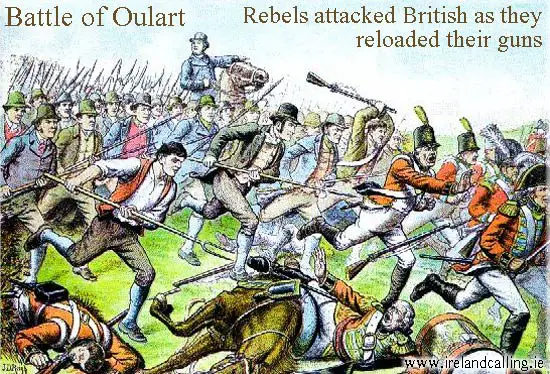
It was also Father Murphy’s idea to rush towns held by the British by herding cattle into a stampede through the streets. The rebels would follow the stampede and take advantage of the mass panic and confusion of their enemies.
However, the rebels were not always successful under Father Murphy’s leadership. They suffered heavy losses at the Battles of New Ross, Arklow, and Newtownbarry.
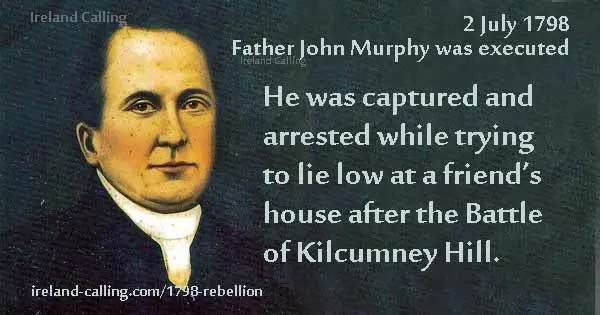 Father Murphy was captured and arrested while trying to lie low at a friend’s house after the Battle of Kilcumney Hill. He was charged with treason and sentenced to death. He was tortured by the British authorities as they tried to get information about the locations and plans of other rebels groups across the country, but he wouldn’t tell them.
Father Murphy was captured and arrested while trying to lie low at a friend’s house after the Battle of Kilcumney Hill. He was charged with treason and sentenced to death. He was tortured by the British authorities as they tried to get information about the locations and plans of other rebels groups across the country, but he wouldn’t tell them.
Father Murphy was stripped, flogged, hanged and decapitated on the streets of Tullow. His body was burnt in a barrel and his head was impaled on a spike and put on display in the town.
Father Murphy is one of the most well-known United Irishmen leaders and considered a martyr by many. Father Murphy’s story inspired Irish songwriter PJ McCall to write the folk song Boolavogue, which has been performed by almost all of Ireland’s top folk musicians over the years.
BITESIZE articles on the history of the 1798 Rebellion
Click here to watch videos of top musicians performing Boolavogue
Click here to read about how McCall came about writing the song
Click here for the lyrics and chords for Boolavogue
Click here to read more about PJ McCall
Jim McCann with The Dubliners performing Boolavogue
* * *
1874 Isaac Butt saw his Home Rule proposal rejected in the House of Commons on this day in 1874. Butt was a politician and lawyer, and a well-respected figure. He campaigned for Irish independence for much of his career, but was ultimately unsuccessful.
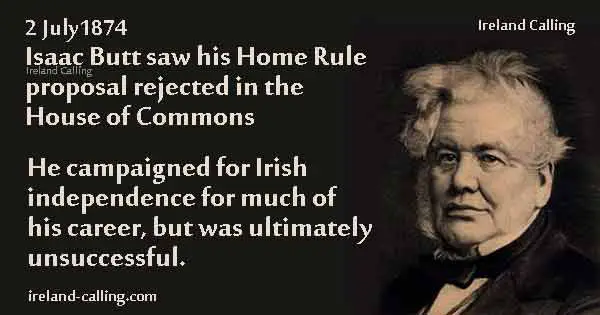
His Home League party was joined by a young Charles Parnell, and although initially the two men worked well together, they began to disagree on the right course of action. Parnell took to filibustering the British parliament when they refused to discuss Irish Home Rule.
Filibustering; The use of obstructionist tactics, especially prolonged speechmaking, to cause a delay of legislative action.
Filibustering was an unusual practice in which an MP would stand and address the house for extended periods, making little or no valid points but continuing to speak. The law at the time stated that MPs had the right to speak for as long as they deemed necessary without being stopped. Parnell took advantage of this rule, to obstruct and disrupt proceedings in parliament and prevent the MPs discussing other important issues. On one occasion, Parnell and his followers spoke uninterrupted for 45 hours.
Butt considered this tactic a waste of time and counter-productive. He felt the Irish Home Rule cause was being undermined by this childish behaviour. He was also becoming frail and weak with old age and retired from parliament to let the younger men continue in whatever way they saw fit.
* * *
1954 Happy birthday to Pete Briquette, born in County Cavan on this day in 1954. He was the bass guitarist for the Boomtown Rats during their heyday in the late 1970s and early 80s. The band had smash hits with songs such as Rat Race and I Don’t Like Mondays.
The Boomtown Rats leader Bob Geldof became a worldwide name when he played a major role in organising the 1985 music concert Live Aid, which consisted of performances from most of the world’s top music stars.
Briquette is still working alongside Geldof as part of his current band. He has also worked as a producer and has collaborated with other top names from the Irish folk scene such as the Dubliners and the Pogues.
Click here to read about more top Irish musicians
* * *
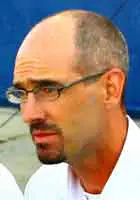 1970 Happy birthday to Steve Morrow, born in Belfast on this day in 1970. He was a professional footballer and had a spell with English giants Arsenal in the early 1990s. Morrow scored his first goal for the club in the final of the 1993 League Cup. The goal secured a 2-1 win for Arsenal and Morrow had won the first trophy of his career.
1970 Happy birthday to Steve Morrow, born in Belfast on this day in 1970. He was a professional footballer and had a spell with English giants Arsenal in the early 1990s. Morrow scored his first goal for the club in the final of the 1993 League Cup. The goal secured a 2-1 win for Arsenal and Morrow had won the first trophy of his career.
After the game, Morrow’s captain congratulated and celebrated with Morrow on the pitch. Adams lifted Morrow up onto his shoulders, so that he could walk around the stadium and parade the match winner to the club’s supporters.
However, 6ft 4 Adams lost his balance and dropped Morrow from his shoulders. The Northern Irishman landed awkwardly and broke his arm, meaning he had to be rushed to hospital before he could receive his winner’s medal.
Morrow missed the rest of the season but did return the following year to help his side win the 1994 UEFA Cup Winner’s Cup with a 1-0 win over Italian side Parma.
* * *
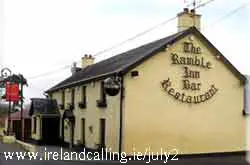 1976 The Ramble Inn Attack took place on this night in Antrim, Northern Ireland on this date in 1976. It was a real example of the mindless killings that took place during the ‘Troubles’ in Northern Ireland in the 1970s.
1976 The Ramble Inn Attack took place on this night in Antrim, Northern Ireland on this date in 1976. It was a real example of the mindless killings that took place during the ‘Troubles’ in Northern Ireland in the 1970s.
The Ramble Inn was a pub ran by a Catholic family, but based in a predominantly Protestant area of Antrim. At about 11pm, three gunmen walked into the pub and opened fire with machine guns indiscriminately at the crowd. Three people were killed instantly, and another three died later from their injuries.
It was suspected the Ulster Volunteer Force was responsible for the attack. They were a paramilitary Protestant organisation. At the time of the attack, the IRA and the British government were at an uneasy truce. This caused the UVF to fear that the government were about to relent to the IRA’s wishes, and make Northern Ireland part of a unified country along with the Republic.
The UVF wanted Northern Ireland to remain as part of Britain. They reacted to this truce by carrying out attacks on Catholics living in Northern Ireland, to send a message that they wanted it to be a Protestant area. The IRA retaliated by carrying out similar attacks on Protestants. Several innocent people were killed in this mindless tit-for-tat sequence.
The Ramble Inn Attack was believed to be the UVF’s response to an attack on a Protestant owned pub in the area that had been carried out a week earlier. Three Protestants were killed by the Republican Action Force, a group that most believed was an off-shoot or associate of the IRA.
No one was ever successfully convicted for the murders at the Ramble Inn, and no group ever claimed responsibility for the attack. Five of the six people killed; Frank Scott (75), Ernest Moore (40), James McCallion (35), Joseph Ellis (27) and James Francey (50) were Protestants, which may have been the reason the UVF didn’t come forward and admit they had carried out the attack if indeed it was them responsible.
The only Catholic victim was Oliver Woulahan, who was in the pub that night to celebrate his 20th birthday.
Find out more of The Troubles in Northern Ireland
* * *
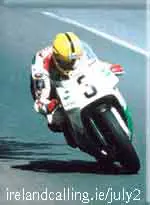 2000 Ireland lost one of its favourite sons on this day in 2000, when world champion motorcyclist Joey Dunlop died after a crash in Estonia. The Northern Irishman had been one of the top racers in the sport for more than two decades, regularly racing at well over 100 mph.
2000 Ireland lost one of its favourite sons on this day in 2000, when world champion motorcyclist Joey Dunlop died after a crash in Estonia. The Northern Irishman had been one of the top racers in the sport for more than two decades, regularly racing at well over 100 mph.
Dunlop’s career and life were tragically ended on 2 July 2000, when he was taking part in the 125cc race on the Pirita-Kose-Kloostrimetsa Circuit. Dunlop was leading the race but lost control in wet and slippery conditions. He careered off the track and headlong into some trees which killed him on impact.
More than fifty thousand people lined the streets of Ballymoney on the day of his funeral. Dunlop was loved by all. The rock band Therapy? wrote and named a song in his honour and the motorcycle racing authorities now hand out the Joey Dunlop Cup to the most successful overall rider at the end of each season.
Click here to read about more top Irish sports stars
july-bottom.html
